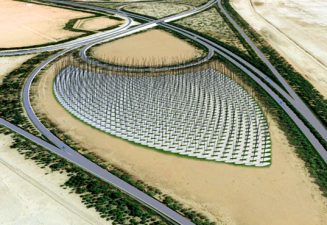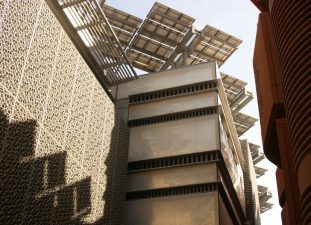 A one-year investigation by researchers will hopefully reveal what incentives are most likely to encourage energy and water conservation among Masdar’s student body.
A one-year investigation by researchers will hopefully reveal what incentives are most likely to encourage energy and water conservation among Masdar’s student body.
There’s nothing sinister about it really. Masdar City in Abu Dhabi is aiming for carbon neutrality in an unforgivingly hot and dry environment teeming with young students. Naturally these twenty-somethings – among the world’s brightest – will strive to achieve the maximum amount of comfort in their spaceship home away from home even as they are participating in one of the most expensive carbon-less experiments on the planet. But now they are being watched! In an effort to understand what incentives and stimuli drive students to switch their lights and taps on or off, Masdar will track their energy and water consumption over the next year.
Masdar’s Dean of Research Professor Scott Kennedy told Vesela Todorova with The National that this investigation will provide a lot of information about the correlation between incentives, stimuli and consumption behavior. With many meters installed throughout the campus, it’s very easy to extract highly detailed information.
“We can monitor within each apartment minute-by-minute electricity consumption, cold water use and hot water use,” he told the paper.
Data collected from this investigation will be used to inform a five year collaboration between Masdar and electricity giant Siemens to eventually incorporate smart-grid technology into Masdar’s energy generation, distribution and transmission system. But to facilitate the smooth operation of smart-grids, which allow consumers to feed back unused energy into the grid, it is helpful to know how they will respond to certain pricing mechanisms.
According to Todorova:
The participants will be divided into four groups. The first, the control group, will not be offered any encouragement or incentives to consume less power.
Group two will be told each day how much power and water they have each used in comparison with their peers. A third group will be offered financial incentives to save.
The last group will be offered energy credits – effectively capping the amount of power they can use. The cap will be based on the projected supply of renewable energy from Masdar City rooftop solar panels.
Professor Kennedy and his team ultimately expect that they will be able to encourage the most energy-efficient consumption behavior in the future by offering the kinds of incentives that actually work among the existing student body. If successful, this information could be widely distributed to help other countries develop proven programs that support energy and water conservation!
:: The National
More on Masdar City:
Ride a Pod Car and Meet Masdar City @ Monthly Fair
Exclusive: Masdar City Open House Photos
Masdar City: Small Hiccups or Total System Failure?



